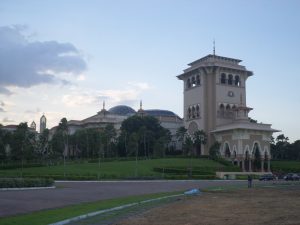Tomorrow, voters in the Malaysian state of Johor will go to the polls in a multi-sided contest that could have far-reaching ramifications on the national political landscape ahead of general elections that could be called as early as July.
Elections in Johor, an economically important state at the tip of peninsular Malaysia bordering Singapore, are always watched closely, but with tomorrow’s poll that will be especially the case. It is the first Malaysian election to be held since a constitutional amendment introduced automatic voter registration and lowered the voting age from 21 to 18 (an amendment known as Undi18). As a result of Undi18, Malaysia’s electorate has swelled by 5.8 million new eligible voters, an increase of around 40 percent, while the number of eligible voters in Johor has increased by almost 30 percent, with more than three-quarters of a million new voters added to the lists.
According to Reuters, this has prompted the raft of competing parties – which include the former ruling coalitions Barisan Nasional (BN) and Perikatan Nasional (PN), an opposition bloc, and a raft of smaller parties and independent candidates – to tweak their campaigns to woo younger and first-time voters. Many parties are fielding younger candidates, and running campaigns that promise jobs, support for digital connectivity, and help for small businesses.
Most observers expect that the state election will see gains by the United Malays National Organisation (UMNO), the dominant member of the BN coalition. At the 2018 election, UMNO and BN were spectacularly tipped out of power at the hands of a new opposition coalition called Pakatan Harapan (PH), led by former prime minister and UMNO turncoat Mahathir Mohamad. In the concurrent elections in Johor, it also lost control of the state government for the first time in six decades, as the PH notched up a substantial 17-seat majority in the 56-seat state assembly.
But UMNO has since returned to power via the backdoor, after internecine political maneuvering brought down Mahathir and his PH coalition government in early 2020. This paved the way for UMNO to return to the governing coalition, as a junior partner of Prime Minister Muhyiddin Yassin’s PN administration. It gained further ascendancy after Muhyiddin’s resignation and replacement by its own candidate, Ismail Sabri, last August.
UMNO stalwarts are now bullish about making a similar reconquest of Johor, as the prelude to reaffirming their return to power at the next general election. After UMNO and BN won a substantial victory at a state election in Melaka late last year, a further success would further consolidate the position of the party ahead of the next general election.
Ismail wrote on Facebook last week that the party was aiming to clinch two-thirds of the state assembly. “God willing, based on the hard work and strong willpower from the Barisan Nasional grassroots, the coalition will win the Johor state elections,” he wrote. “We only have one choice, to win big! The word defeat is not in our battle dictionary.” BN chairman Ahmad Zahid Hamidi has expressed similar confidence, claiming that the coalition, borne along by the momentum from the Melaka polls, is aiming to win 38 out of the 56 available seats.
Aside from PH, the other important player will be the PN coalition, the most dominant member of which is Parti Pribumi Bersatu Malaysia (Bersatu). Despite serving as a partner of BN in the last state government (as it did at the federal level under Muhyiddin), PN will be competing head to head with BN in Johor. The former has mostly focused its campaign efforts on anti-corruption appeals, a dig perhaps to the gargantuan 1MDB corruption scandal that embroiled former Prime Minister Najib Razak of UMNO, and helped bring about his government’s defeat at the 2018 election. Despite the ongoing criminal cases concerning his involvement in the 1MDB theft, Najib has been on the hustings for BN in Johor, and there are even rumors that he could somehow finagle his way back to power after the next general election.
But as Ong Kian Ming noted this week, the Johor election poses a more significant challenge to BN than the poll in Melaka did. In Melaka, the PH enjoyed a majority of just two seats over BN (15 vs. 13) in the 28-seat state assembly. In Johor, PH currently enjoys a much more substantial 17-seat majority.
Then there is the unknown impact of the influx of young voters. While it is probably incorrect to assume that a greater youth vote will translate to a greater support for the reformist agenda of PH or a sharp turn against the ethnic Malay nationalism that has served UMNO so well since independence in 1957, it stands to reason that such a large increase of the electorate will alter the political dynamics in Johor, and in the country at large, in unpredictable ways.
Whatever happens in Johor will bear watching as an indication of how Undi18 will impact the next general election, and whether the change in the electorate is matched by any significant change in the patterns and themes that have long governed Malaysian politics.

































